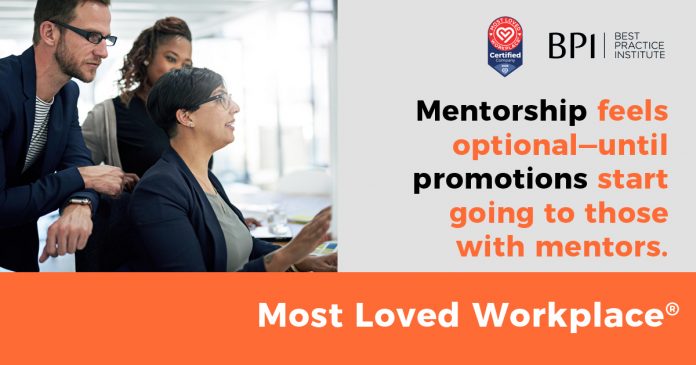Research consistently shows that organizations investing in structured mentorship for young professionals see measurable returns. A 2024 study found mentees were 72% more likely to stay, while mentors had a 69% retention rate, compared to just 49% for non-participants.
This trend holds true for Most Loved Workplace®-certified companies. Synopsys, known for its internship-to-career mentorship programs, retains 30% more early-career engineers who receive mentor support. Their career pathways highlight how tailored guidance boosts loyalty and performance.
The financial impact is significant. With replacing an entry-level employee costing nearly two times their salary, mentorship-driven retention saves $15,000–$30,000 per employee, money reinvested in growth and innovation, according to Gallup research.
For young professionals, mentorship offers clarity and direction in early career stages. Direct guidance from experienced peers reduces job-hopping, accelerates skill growth, and builds a foundation for lifelong career resilience.
Peer & Reverse Mentoring for Young Professionals
Peer mentoring delivers strong retention and engagement benefits. A study from Franklin Pierce University found mentees paired with peers were twice as likely to stay as those who lacked guidance. This aligns with Gen Z’s preference for approachable, relatable support.
At Synopsys, for example, junior engineers mentor interns on technical hurdles and company culture. This peer structure deepens engagement and emphasizes belonging. Participants report higher engagement and project confidence, reinforcing BPI’s focus on mentorship for workforce transformation.
Reverse mentoring adds further value. A recent Times article notes companies like PwC and Procter & Gamble using junior-to-senior mentoring to close generational and tech gaps. These programs help young professionals with voice and influence in the workplace.
Both models strengthen inclusion, accelerate leadership readiness, and enhance retention by giving young employees a voice in organizational decisions. Young employees become catalysts of change, influencing senior decisions on remote work, inclusion, and technology strategy. That exposure boosts their leadership readiness and long‑term investment in the organization.
Designing Scalable Mentorship Programs
To scale mentorship effectively:
- Start with a clear purpose—retention, leadership pipeline growth, or faster career progression.
- Train mentors for impact—MLW-certified Synopsys offers structured training to ensure cultural fit, consistency, and high-value exchanges.
- Use participant-driven matching—Platforms that allow mentees to choose mentors based on career goals see higher satisfaction and success rates.
- Measure and refine quarterly—Track engagement, promotion rates, and retention to continuously improve the program.
MLW-certified Synopsys provides structured orientation and training to early-career mentors. That ensures consistency, cultural fit, and high-impact exchanges for mentees.
Use blended matching platforms that allow mentees to select mentors based on career interests. Studies show that participant-driven matching improves program satisfaction and outcomes.
Track outcomes quarterly through engagement surveys, promotion rates, and retention metrics. Use data to refine pairings and identify scale opportunities. Leaders can gradually expand these models across role levels, starting with interns and building through junior roles.
Check Out BPI Career and Development Resources
Supporting Mentor Effectiveness Through Training
Mentor training increases skill, confidence, and inclusion. HBR notes that 75% of executives credit their mentors for success, while 90% of employees with career mentors report high job satisfaction.
Training should include active listening, inclusion awareness, and alignment with talent goals. Synopsys mentors attend workshops for structured guidance, cultural sensitivity, and developmental dialogue.
Combine online modules with mentor peer groups to foster reflective practice and resource-sharing. For example, MentorCloud describes how peer learning communities strengthen mentor competency.
Provide mentors with conversation templates and goal-setting guides that ensure discussions are meaningful, culturally fluent, and growth-oriented. Remember, strong mentor skill ensures early-career mentees receive consistent, quality guidance.
Ensuring the Right Mentor-Mentee Match
Matching mentors to young professionals influences program success. Research shows that successful mentor-mentee pairs improve satisfaction and retention by 25% over mismatched pairs. That highlights the importance of thoughtful pairing.
Companies that adopt these practices use interest and skills surveys to pair junior engineers with mentors in aligned technical domains. This ensures conversations stay relevant and impactful for career development.
Trust built through thoughtful pairing leads to higher performance, stronger relationships, and measurable bottom-line benefits.. In essence, young professionals feel seen and better equipped with aligned guidance.
During program setup, ask mentees to list objectives: technical growth, leadership insight, or culture fit. Use these indicators to guide matching. Adjust quarterly by collecting feedback and making necessary improvements.
In doing so, mentoring relationships remain purposeful, adaptive, and effective for early-career growth, with meaningful engagement at every stage.
Structuring Mentor Support for Professional Growth
Mentoring relationships thrive when structured around development. Harvard Business Review shows that mentees, as a direct result of being satisfied in the workplace, work harder. As a result, they are five times more likely to earn a promotion when programs follow clear milestones and check-ins.
BPI’s leadership learning and developmental programs, used by MLW-certified companies, provide conversation guides, milestone templates, and progress charts that leaders can use to improve themselves. This, in turn, transforms aimless meetings into focused development sessions each time.
Furthermore, this structure also reduces role confusion. Research in academic and corporate mentoring shows mentees thrive when mentors avoid managerial oversight and stick to advisory roles instead. Effective mentorship focuses on guidance, not micromanagement.
Leaders should encourage goal-focused agendas like career aim refinement, growth skill practice, and feedback loops. These elements help early-career professionals gain clarity and build momentum toward promotion and performance.
Ultimately, mentoring becomes a coaching experience with leaders equipped to support growth—not just friendships with direction.
Remember, successful mentorship programs evolve through feedback. Greening & Ann (2025) recommend quarterly feedback cycles tied to career progress and experience surveys.
If your organization is ready to launch or scale a mentorship program that drives retention, engagement, and leadership development, BPI can help you design a model tailored to your culture and business objectives.

Request A Consultation Today to Start Shaping Tomorrow’s Leaders










